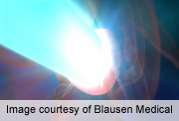A nomogram has been developed to predict five- and 10-year mastectomy-free survival in older women with early breast cancer and estimate the predicted benefit of radiation therapy following conservative surgery, according to research published online June 25 in the Journal of Clinical Oncology.
(HealthDay) -- A nomogram has been developed to predict five- and 10-year mastectomy-free survival (MFS) in older women with early breast cancer and estimate the predicted benefit of radiation therapy (RT) following conservative surgery (CS), according to research published online June 25 in the Journal of Clinical Oncology.
In an effort to develop a nomogram to predict five- and 10-year MFS rates with and without RT, Jeffrey M. Albert, M.D., of the University of Texas MD Anderson Cancer Center in Houston, and colleagues utilized population-based data from 16,092 women aged 66 to 79 years who participated in the Surveillance, Epidemiology and End Results Program.
The researchers found that overall five- and 10-year MFS rates were 98.1 and 95.4 percent, respectively, after a median follow-up period of 7.2 years. Significant predictors of time to mastectomy included age, race, tumor size, estrogen receptor status, receipt of radiotherapy, and nodal status. The nomogram developed was able to accurately predict MFS.
"In summary, we used population-based data to develop a nomogram to estimate five- and 10-year MFS among older women with early breast cancer treated with CS," the authors write. "This clinically useful tool uses readily available clinicopathologic factors to estimate the probability of MFS and can further aid individualized clinical decision making by estimating the potential benefit from RT for this large and growing patient population."
One study author disclosed a financial tie to Varian Medical Systems, which contributed funding to the study.
More information:
Abstract
Full Text (subscription or payment may be required)
Editorial
Journal information: Journal of Clinical Oncology
Copyright © 2012 HealthDay. All rights reserved.


















